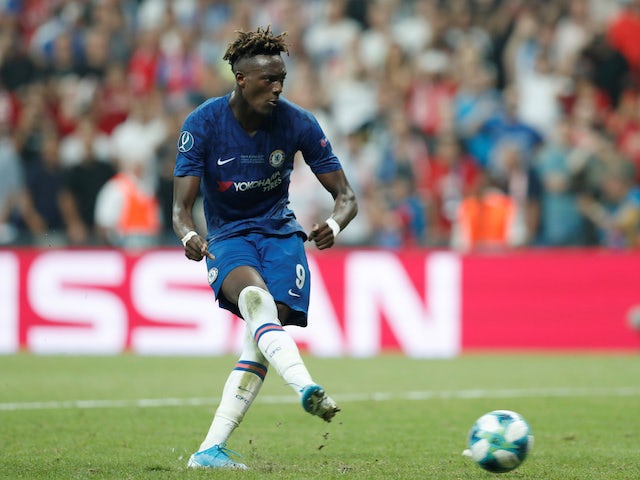England’s recent invitations to Chelsea’s Fikayo Tomori and Tammy Abraham to join the English national team for upcoming internationals have caused a social media storm for Nigerians.
Of course, the two players are talented young players with a great future ahead of them and their dual opportunity to play for either Nigeria or England raised some hopes that they could be part of a future Super Eagles team. But by England inviting both of them, they could be lost forever if they appeared even for a second in a competitive game for England. But did Nigeria really have a chance that those two would have ever appeared for the Super Eagles?
Read Also Abraham not ruled Nigeria out
Certainly, there is always a chance if only because they are eligible to play for either country. But one must clearly understand where, logically, one should expect the sentiment of these players to be and why.
Some analysts argue that administrative problems in Nigeria’s football could be the major hindrance and others argue that the players are Nigerians and should have chosen Nigeria ahead of any other country. I think that while the first point may have some truth to it, it isn’t the entire truth. As for the second, that point simply demonstrates a lack of knowledge of what these players represent.
Overcoming Problems of Nigerian Football
First, we have had several other players who have lived most of their lives outside the country who chose to play for Nigeria. Thus, the administrative hindrance cannot be a decisive factor. Even if it is, the lure of playing international football appears to trump that hindrance.
Think of Victor Moses, Alex Iwobi, Leon Balogun, Tyrone Ebuehi (below), Ola Aina, Joe Aribo, among others. They all chose Nigeria. They only have to spend less than a week in Nigeria to participate in a home game for Nigeria. That isn’t such a problem. Isn’t it? It certainly isn’t a cost that outweighs the huge reward of playing international football.

But I have to make it clear that one does not understate the issues of Nigeria’s administrative lapses and headaches. After all, Nigeria has some home grown athletes who have left the country to represent other countries in several sports including football because of those lapses.
In the case of football, think about Emmanuel Olisadebe who grew up in Nigeria and spent most of his life in the country but ended up playing for Poland. Whether his specific reason is because of administrative lapses or not, we know he wanted to play international football. Ultimately, in the case of such individuals, the lure of playing or participating in international competition was there, if not with Nigeria, with some other country.
Is Nigeria Always the First Choice? Should it Be?
On the second point, there is this belief that if one has a Nigerian parent then the person’s identity has to be Nigerian. That is just not realistic. Nigerianess is different for a first generation Nigerian compared to a second or third generation Nigerian in a foreign country.
While the parents of these Nigerian footballers are first generation, the players are second generation with most likely choosing a different identity. While the former (parent) feels Nigerian because of his/her predominant Nigerian cultural identity and friendship network, the latter (footballer) bred in a foreign country feels less Nigerian because of his predominant foreign cultural environment and friendship network.
These characteristics make it more reasonable that the footballer, bred outside Nigerian, is more likely to choose that foreign country ahead of Nigeria. It would make less sense to do otherwise. This explains why the more likely choice is a foreign country for the player who has a genuine opportunity to play for that foreign country. Nigeria becomes a fallback or the default if that first choice fails, especially for a player intent in earning an international career.
Tomori and Abraham represent the first ever dual nationality players who had a genuine chance to play for a foreign country at the time Nigeria expressed interest. For them to choose England ahead of Nigeria should be expected. Both Victor Moses and Alex Iwobi who had/have stellar careers for Nigeria did not have that genuine chance when Nigeria made the approach.
It is a victory that now England probably regrets losing those two but the reality was that they were not on England’s radar at the time they chose Nigeria. The way to overcome the cultural lure and situatedness that impact the decision of the second generation Nigerian or the first generation who has spent most of his life in a foreign country is either to perform at a much higher level than the national team of their foreign residence or to create a first class administrative environment that trumps that of their foreign residence. In terms of those two later factors, Nigeria is still in the process of imagining.










Another point is the player’s manager at club level and figures around him. Consider the first point. Even if England had Iwobi and Moses on their radar, the pressure would be less complicated like Tammy’s and Tomori’s who have an English manager, rubbing the agenda in every day. Iwobi had Wenger who was not really bothered and would not push am agenda, same with Moses at the time. In terms of figures, Iwobi had Austin Okocha to seek advice from regarding all issues concerning football, same with Moses who had Mikel and other London based Eagles for advice and support.